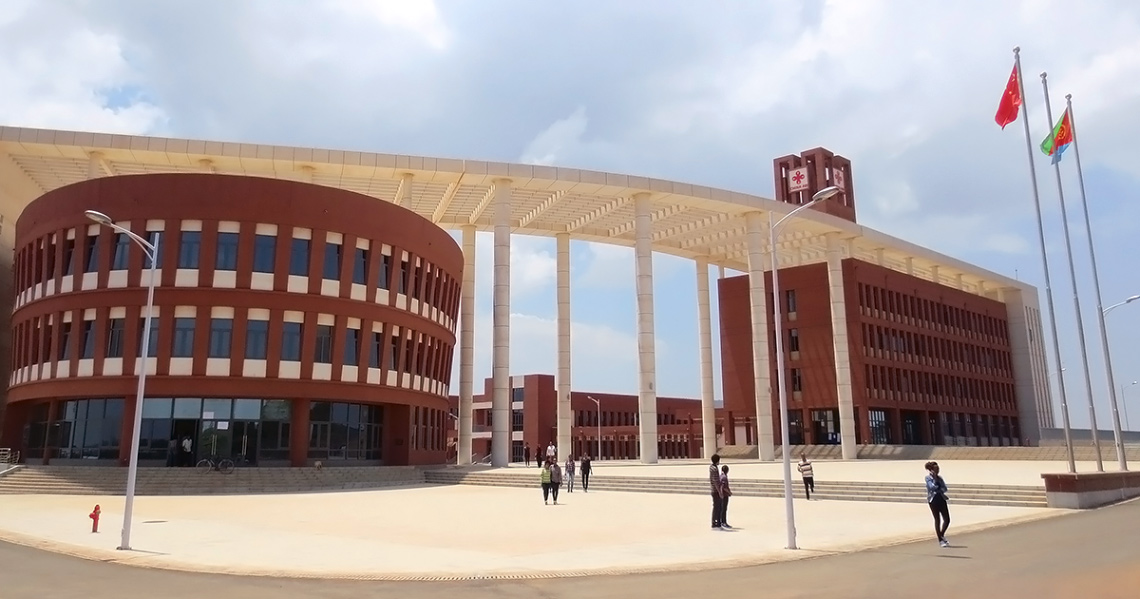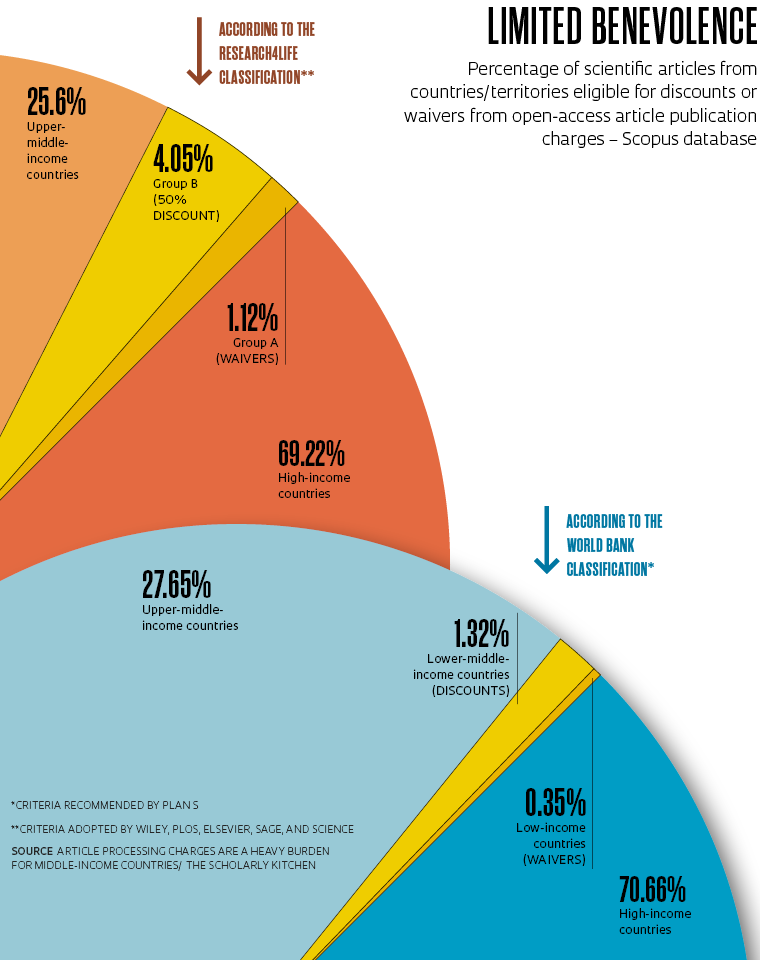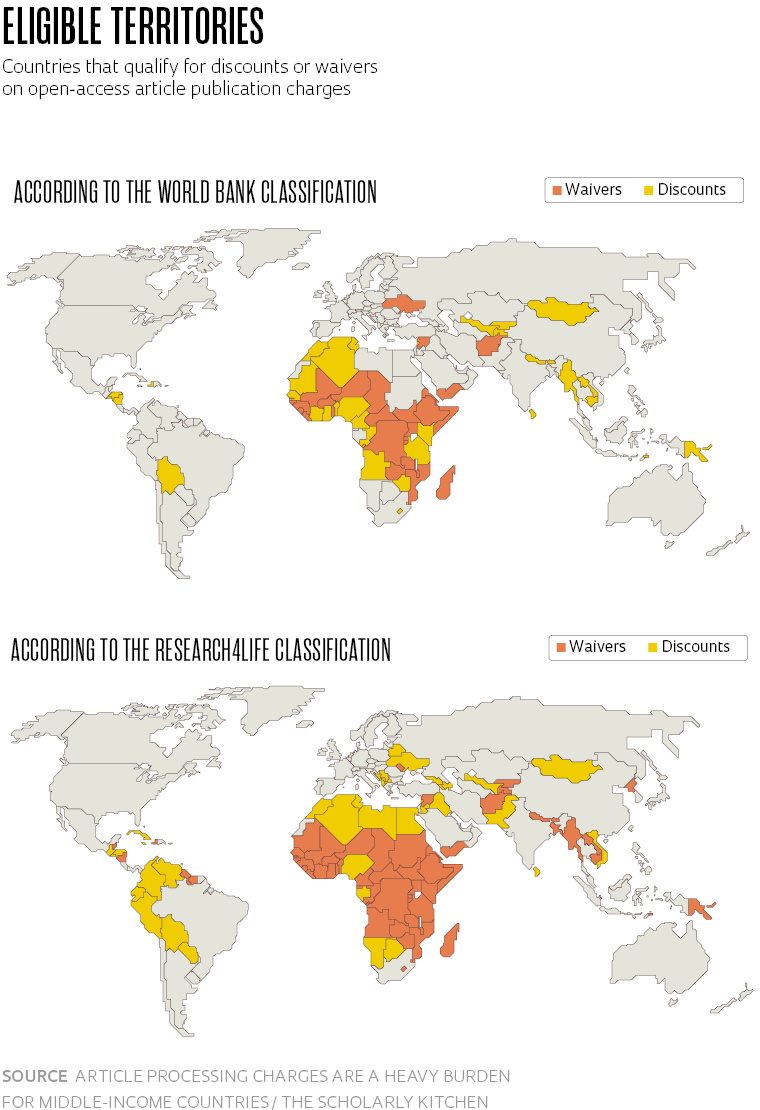A study by researchers from the University of São Paulo (USP) and the University of Campinas (UNICAMP) highlighted an obstacle faced by scientists from developing countries seeking to publish articles in prestigious international journals. With the increasing adoption of the open-access model, through which readers are given free access to articles online without having to subscribe to journals, the costs of publication have begun to fall on the authors and their institutions and funding agencies, which have to pay journals what can often be prohibitive publication fees. Scientific publishers have acknowledged the problem and implemented discount and waiver policies for authors from countries of lower income. However, the Brazilian study, published on academic blog The Scholarly Kitchen in March, demonstrates that the solution is ineffective—these policies are highly restrictive and inaccessible to researchers from middle-income countries like Brazil.
The study found that according to the criteria adopted by Research4Life—a coalition of publishers including Wiley, PLOS, Elsevier, Sage, and Science—only 1.12% of articles in the Scopus database published between 2012 and 2021 would have been eligible for waivers, which are granted to authors who live in low-income nations, mostly in Africa, but also in conflict zones like Yemen, Syria, and Afghanistan. Another 4.05% would have been offered discounts of up to 50% off article-processing charges (APCs) because they originated from lower-middle-income economies, including countries in North Africa, Latin America, and South Asia. Based on the criteria established by Plan S, an open-access publishing initiative implemented in 2021 by a group of major European funding agencies and organizations such as the Bill & Melinda Gates Foundation, the limitations are even greater. Only 0.35% of articles would have been eligible for waivers and 1.32% for discounts. Under Plan S, national incomes are classified according to the World Bank’s criteria. This system is currently being used by publishers such as Springer Nature and Taylor & Francis.
“In my specialty, scientific journals charge between US$3,000 and US$5,000 to publish an article, but there are extreme cases, such as journals in the Nature collection, where the cost exceeds US$11,000,” explains biochemist Alicia Kowaltowski of USP’s Institute of Chemistry, lead author of the study, which was coauthored by physicist Paulo Nussenzveig and biologist Ariel Silber from USP, and mechanical engineer José Roberto Arruda of UNICAMP.
The analysis shows that the prohibitive cost of publication hurts middle-income countries. In very poor nations that qualify for waivers and discounts under Research4Life’s criteria, 52% of articles are available via open access. Among high-income countries, the percentage is 45%. But in middle-income countries like Brazil, which do not benefit from waivers or discounts, the proportion of open-access articles drops to 32%. “These countries have much smaller research budgets than high-income economies, but they are expected to pay full APCs. The data show that due to the high costs, they are being excluded from this publication model,” says Kowaltowski.
The study proposes the expansion of waiver policies to include authors from low- and lower-middle-income countries, and the application of 50% discounts to all upper-middle-income economies. “In practice, this would result in full waivers for around 2% of authors and discounts for approximately 25%. This could easily be absorbed by most publishers—the sector is known for its high profit margins of over 30%,” says Kowaltowski. She acknowledges that many publishers say they are willing to negotiate individual requests for waivers and discounts. “But personal requests have disadvantages, such as reduced bargaining power. FAPESP covers APCs for articles by researchers they are funding, but to a maximum limit of R$12,000, an amount that is more than generous. I use this limit to ask publishers for discounts, but it usually takes five or six emails before anyone starts listening,” says the researcher.
The study’s proposal provoked some strong reactions. American information scientist and consultant Phil Davis criticized the idea of expanding waiver and discount policies, arguing that the move would financially suffocate small regional publishers that predominantly serve authors from low- and middle-income countries. “Those who are quick to blame commercial publishers for their monopoly-like grip on the market and their ‘unusually high profit margins’ may be surprised to find that their policy, if adopted, would only lead to strengthening commercial publishing,” he wrote in the blog post’s comment section.
In middle-income countries, the proportion of articles published via open access is smaller than in low-income countries that benefit from APC discounts and waivers
Abel Packer, head of the SciELO Brasil scientific journal library, believes the article by Kowaltowski and colleagues succeeds at highlighting the debate on the cost of APCs to researchers in developing countries, which is a key issue in the advancement of open-access science. “A more equitable approach is needed. A Brazilian researcher cannot pay the same amount as a researcher from Sweden. The purchasing power here does not reach the same level, it is simply a matter of equity,” he says.
He notes, however, that the study addressed only one aspect of the problem. “We also need to question the system as a whole and remember that scientists only feel they need to publish in journals with high APCs due to the requirements of current assessment systems for career progression.” He points out that the mission of SciELO, funded by FAPESP over the last 25 years, has been to promote more than 300 open-access journals in Brazil, many of which do not even require APCs for Brazilian scientific articles, even though these titles lack the impact and reputation of elite journals. “We have high-quality national journals that are willing to publish good articles by Brazilian authors,” he says.
José Roberto Arruda, coauthor of the paper, says the team did not underestimate the importance of open-access initiatives such as SciELO, but the aim was to demand more effective waiver policies from major commercial publishers. “This is vital to allow researchers from upper-middle-income countries to continue to publish in prestigious scientific journals while APC-based open-access models continue to be used,” he said. In response to Phil Davis’s criticism, Arruda says that it is not necessarily a question of reducing publisher revenues, but of better distributing costs among researchers from countries with different income levels and different research-funding circumstances.
In theory, the APC-based open-access model should soon change. In its original conception, Plan S stated that all articles resulting from research funded by signatory agencies and countries should be published exclusively in open-access journals from 2020 onwards. That start date was eventually pushed back to 2021 and the rules relaxed, allowing hybrid publication models to be used until 2024, through which authors can pay to publish open-access articles in journals that also sell subscriptions. From 2025 onward, this intermediate format will no longer be accepted, with publishers expected to start publishing articles in open access only, by entering into comprehensive agreements with national governments, funding agencies, or institutional libraries to redirect the money currently spent on journal subscriptions to the payment of APCs to make articles freely available online.
The prospect of that happening, explains Kowaltowski, is still uncertain. “It is not clear what will happen. Plan S was mostly adopted in Europe and not elsewhere.” China, which has surpassed the USA in the volume of scientific articles, is not part of the arrangement. The US government, meanwhile, belatedly decided at the end of last year that its federal agencies must create policies by 2025 to ensure that all publications they fund are freely available to the public via open access. The plan of attack is yet to be determined and may include the use of preprints. When that happens, the speed of any changes in the international scientific communication landscape will become clearer.
Until now, Brazil has stayed away from the debate, although in 2020 it invested R$380 million in contracts with scientific publishers to make the content of their journals available to Brazilian researchers on a journal platform created by CAPES (Brazilian Federal Agency for Support and Evaluation of Graduate Education), an agency run by Brazil’s Ministry of Education that assesses and funds graduate programs. Things in the country are starting to change. In a statement given to Pesquisa FAPESP, CAPES said that “it is committed to reaching transformative agreements that allow the academic community to publish articles in open access, in addition to subscriptions to scientific publications.” According to the agency, it is working in partnership with institutions such as the Brazilian Society for the Advancement of Science and the Brazilian National Council for Scientific and Technological Development to lead a movement demanding researchers in Brazil be able to publish at prices that reflect the country’s socioeconomic situation.
The agency recently began consulting with the scientific community on the topic and a collaborative workshop is set to be held in May to discuss open-access publication. “One of the subjects we address will be the payment of article-processing charges within the scope of our Journal Platform contracts,” says the statement from CAPES. The topic was also on the agency’s agenda last November, at the fifth edition of the Journal Platform Seminar. “With the upcoming workshop, the objective is to continue the theme and deepen discussions in the academic community.”
Republish

